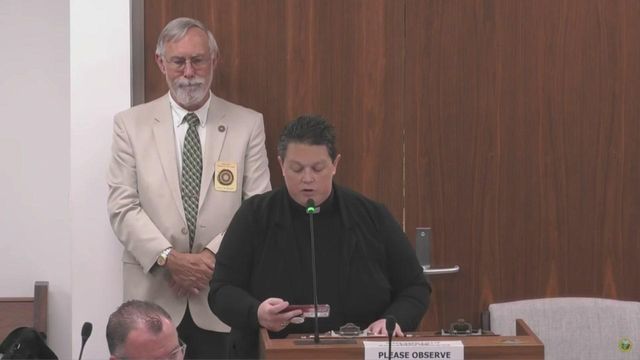With DEI policies, UNC may follow Florida's lead, trustee predicts

A well-connected member of the University of North Carolina Board of Trustees says he expects the university system to be forced to scrap some of its diversity, equity and inclusion policies later this year.
Jim Blaine, a UNC trustee and former advisor to Republican state Senate Leader Phil Berger, told his board colleagues last week that he expects state lawmakers or the Board of Governors to take further action against DEI initiatives. Just last month, the University of Florida eliminated its chief diversity officer position in response to new state laws.
In the past year, Republican state lawmakers have said public universities and other parts of state government should be banned from pushing pro-diversity views on state employees and college students.
“It's my belief that it is likely that the Board of Governors or the state legislature will follow Florida's path as it relates to DEI this year,” Blaine said during the March 27 UNC Board of Trustees meeting.
State legislators are scheduled to begin this year’s governing session on April 10. Blaine’s comments carry weight because he has connections to many of the state’s Republican lawmakers, and the GOP holds a supermajority in the state legislature.
House Speaker Tim Moore’s office confirmed that it is reviewing DEI legislation but declined to say what Republican leaders might propose. Senate Leader Phil Berger’s office declined to comment.
Blaine didn’t elaborate during the meeting on the specific changes he expects to see, but said the university system should prepare to move forward without some of its DEI policies.
“Rather than us be caught flat-footed, I would suggest that we start to develop a contingency plan for that expectation,” Blaine told the board. He then suggested that money saved from eliminating DEI-related policies could allow the state to increase graduate student salaries. Or, he said, it could fund programs that help students struggling to finish their college courses and secure their diploma.
Blaine didn’t respond to a request for comment.
Diversity, equity and inclusion efforts are common in academia and the corporate world. DEI programs are typically aimed at teaching people how to eliminate bias against minority groups in their hiring process and discrimination in their work environments. Critics argue that the programs are unnecessary and fear some training includes political undertones, which they say is unfair.
Trustee Marty Kotis said he agreed with Blaine, saying the university’s DEI efforts are an example of “administrative bloat.” Eliminating DEI policies and the 37 jobs related to those policies could free up more than $3 million, Kotis estimated.
“We need to be looking at administrative functions and bureaucracy and deciding if that's really the most effective way to affect change,” Kotis said.
“That could be 370 $110,000 scholarships or stipends — a lot of mentoring efforts out there,” he said. “The sentiment for a lot of folks around the state is that DEI is causing more divisiveness than coherence at the university level.”
Trustee Ralph Meekins discouraged the board from taking action before the UNC Board of Governors or state lawmakers.
“We need to wait for them to give us the direction that we need before we start making decisions,” Meekins said. “I don't think the Board of Governors would appreciate us trying to jump the gun on those kinds of issues.”
Gov. Cooper, a Democrat, has argued that diversity improves the strength of the university system and has criticized leaders of the university and Board of Governors for injecting their political beliefs into academia.
"We have built the most amazing public university system in the country," Cooper said in June. "Yet it is obvious that erosion is occurring because of the makeup of the UNC Board of Governors and boards of trustees that have become more political and have begun exercising more direct control in the administration of our campuses."
North Carolina’s governor used to appoint some members to campus boards of trustees, but Republican lawmakers changed that after the 2016 elections, when Cooper beat Republican Gov. Pat McCrory.
In 2022, Cooper created a task force to study the power structures at the top of the state's university system. The task force last year proposed changes to the university system aimed at increasing diversity. Republican lawmakers haven’t taken up the changes and aren’t expected to do so.
In a statement to WRAL Tuesday, Cooper's office said the governor remains concerned about Republican rhetoric affecting North Carolina's students, universities and business recruitment.
"Private businesses hire diverse workforces to increase their profits because they know input from different perspectives make them better, and the same goes for our universities and our state government," Cooper spokesperson Jordan Monaghan said in an email.
"Instead of embracing Fox News style attacks on campus diversity, legislators and university leaders should adopt the bipartisan recommendations put forward by the Governor's Commission on University Governance," Monaghan said.











